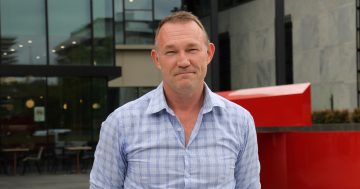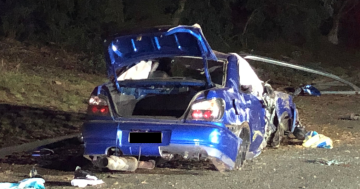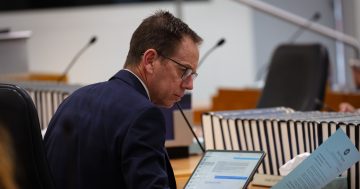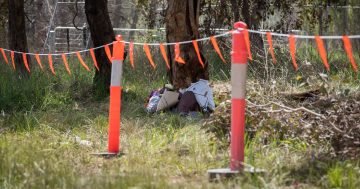
Matthew McLuckie (right) stands with his younger brother, Joseph, and his father, Tom McLuckie. Photo: ACTnowforsaferroads.
The ACT Law Reform and Sentencing Advisory Council (LRSAC) has begun its public consultation period for its referral to the ‘Dangerous driving: sentencing and recidivism’ panel and wants to know the public’s thoughts on the sentencing process for such offenders.
One person who will be making a submission is Tom McLuckie.
It has previously been alleged that on 19 May 2022, a driver had drugs in her system when she drove a stolen car onto the wrong side of the road at almost 180 km/h before she crashed into the car of Mr McLuckie’s 20-year-old son, Matthew.
Matthew died the next day. The alleged driver remains before the courts.
“For the most serious crimes, specifically culpable driving causing death and [grievous bodily harm], despite what the report states as per Crimes Sentencing Act and the Monfries appeal that no one purpose is to be prioritised over any other purpose, it is clear from recent judgements that rehabilitation is being given priority over all other purposes,” Mr McLuckie said.
He said this was reflected in several recent judgments, citing the sentence for the 16-year-old who killed Susi Kopysiewicz and Claire Sankey in a crash on 9 October 2022, the man who killed disability advocate Sue Salthouse by crashing into her on 20 July 2020, as well as the drunk driver who killed ice hockey player Lachlan Seary on 8 March 2021.
LRSAC is asking whether the public believes the current maximum penalties for driving offences are appropriate and whether there are any specific aspects of sentencing practices that need reform.
“The council is particularly interested in hearing diverse perspectives on how best to address repeat offending and enhancing the safety of our community,” former ACT magistrate and LRSAC chair Lisbeth Campbell said.
“Some of the most valuable insights to the matters canvassed in this consultation paper may come from community members.”

Former magistrate Lisbeth Campbell is now the Law Reform and Sentencing Advisory Council chair. Photo: Albert McKnight.
When asked for his thoughts on the topic of repeat offending, Mr McLuckie said a Freedom of Information request from Corrective Services showed that of 49 detainees at the Alexander Maconochie Centre who had been involved in serious motor vehicle offences, 48 were repeat offenders.
“We [see] the same offenders constantly reappearing at our courts and sometimes multiple generations of the same families,” he said.
“Operation TORIC [which targets recidivist offending and dangerous driving in the ACT] has also clearly demonstrated that repeat offending is a huge challenge for all categories of those on provisional liberty – bail, good behaviour orders, intensive correction orders and parole …
“Of 134 cases that since January 2019 to September 2023 went to the Supreme Court involving ‘dangerous driving’ offences, 130 of these offenders had a mention of previous offending. This is despite our government claiming it is addressing recidivism.”
LRSAC is an independent expert body that provides high-level advice to Attorney General Shane Rattenbury on law reform and sentencing matters.
This consultation period will focus on the sentencing of dangerous driving offenders, including repeat offenders, in the context of recommendations arising from the Standing Committee on Justice and Committee Safety Report No. 16 Inquiry into Dangerous Driving, which can be viewed here, along with the government’s response to those recommendations.
The council has published a consultation paper that contains 16 questions directed to the referral’s terms of reference to help shape submissions.
LRSAC wants to hear from a wide range of people and also welcomes submissions from practitioners, institutional organisations and agencies whose work is relevant to the subject matter of the consultation paper.
The consultation paper is here. You can make a submission by clicking the same link.
Submissions are due by 7 May and LRSAC will hand its recommendations to Mr Rattenbury by 30 July.





















